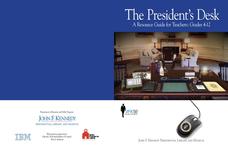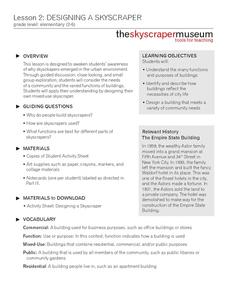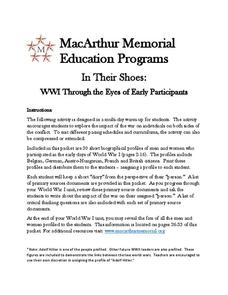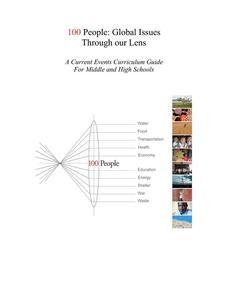Staples Foundation For Learning
The President’s Desk
What stories can a desk paperweight and picture frame possibly tell us about the president of the United States? Pupils are transported to the desk of President John F. Kennedy through an engaging interactive site. The guide offers...
DocsTeach
Evaluating a Needlework Sampler as Historical Evidence
Needlework isn't just for home decor; it can also help record family history. Academics analyze a needlework sampler to understand how they were used to record marriages and births. The activity includes a series of written questions,...
NET Foundation for Television
1850-1874 Homestead Act Signed: Who were the Settlers?
Life in the great, wide-open spaces of the West! Scholars analyze the reasons behind the vast movement to the Great Plains after the passing of the Kansas-Nebraska Act and the Homestead Act. Using photographic, document, map, video, and...
DocsTeach
Exploring America's Diversity: Gertrud Danneberg (Beginner)
Everyone is an immigrant in their own way. Young scholars read historic documents to understand one woman's journey from Germany to the United States. The activity uses a mixture of text, discussion, and written prompts to help...
National Endowment for the Humanities
On This Day With Lewis and Clark
Walk in the footsteps of Lewis and Clark as they discover the wonders, beauty, and dangers of the American frontier. After gaining background knowledge about Thomas Jefferson and the Louisiana Purchase, young explorers use primary...
DocsTeach
Alfred Sinker and the Writ of Habeas Corpus in 1861
Scholars learn how the judicial system treated under-age Civil War soldiers using historical analysis. The resource uses court documents to help historians understand why Habeas Corpus was used in the case of Alfred Sinker and why he was...
Skyscraper Museum
Designing a Skyscraper
Besides serving as awe-inspiring monuments of human achievement, skyscrapers are built to perform a wide range of functions in urban communities. The second lesson in this series begins by exploring the history of the Empire State...
NET Foundation for Television
1850-1874 Notable Nebraskan: J. Sterling Morton
What are the characteristics of an outstanding citizen? Nebraskan J. Sterling Morton contributed to the formation of societal and family values in his state. Learners gather information on Morton's life accomplishments from primary...
Alabama Department of Archives and History
Alabama Farm Life in the Great Depression
The Great Depression not only impacted city folk and factory workers, it also had a profound effect on farmers. Young historians examine primary source materials that document the struggles of Alabama farmers during this time and...
American Museum of Natural History
Create Your Own Time Capsule
The corona virus pandemic is indeed a historic event. A time capsule activity permits young historians to document these days of social distancing, remote learning, and quarantine by collecting artifacts that capture what their lives are...
MacArthur Memorial
In Their Shoes: WWI Through the Eyes of Early Participants
Several social activities provide showcase the perspective of many prominent figures in World War I history. Students read an assigned case study about a memorable person and complete several activities to further understand this...
100 People Foundation
100 People: Global Issues Through Our Lens
If the world were 100 people...17 would not have access to safe drinking water, 18 would not be able to read or write, and 52 would not have a primary education. Using the theme of "100 people," this resource explores other major issues...
Alabama Department of Archives and History
Changes in Transportation over Time
Planes, trains, and automobiles. How many ways to travel are there? Scholars learn about modes of transportation in the past and how they have changed over time. Budding historians view a timeline, participate in group discussion, and...
Lisa Staab Shadburn
Play Therapy Activities to Enhance Self‐Esteem
Discover activities to help learners increase self-awareness, build peer and family relations, and develop positive self-esteem. Here you'll find six suggestions for instilling a sense of confidence and self awareness in youngsters. Each...
Southern Kennebec Child Development Corporation
Sun Blocks: Building a Foundation for Healthy Skin
Here comes the sun! Primary graders engage in activities that teach them how to protect themselves from the effects of UV rays. They learn that each season (fall, winter, spring, and summer) offers its own special challenges so they...
Park City Historical Society & Museum
Oral History Interview Questions Worksheet
What is an oral history interview? What goes into the planning and what should be said? Why is it important that we know and learn from oral history? This is an excellent worksheet to support your young historians as they conduct...
Alabama Department of Archives and History
Women of the Movement: Civil Rights Movement in Alabama
Many know of Rosa Parks involvement in the Civil Rights Movement, but who were other female leaders? The lesson focuses on female Civil Rights leaders and their achievements. Scholars complete research, participate in group discussions,...
Alabama Department of Archives and History
Working in Birmingham's Iron Industry
What did railroads, iron, and industry contributed to Birmingham's successful growth? The activity explains how the iron industry worked. It also describes how the location of Birmingham and its proximity to railroads. played a key role...

















